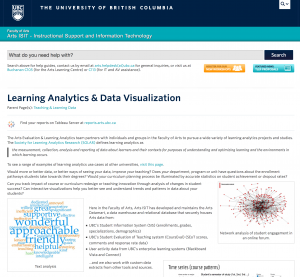
Leah P. Macfadyen
Learning analytics, as defined by the Society for Learning Analytics research (SoLAR), refers to “the measurement, collection, analysis and reporting of data about learners and their contexts, for purposes of understanding and optimizing learning and the environments in which it occurs.” Developments in education and learning technologies in recent decades mean that universities are now awash in data about learners and learning. Online teaching tools such as Learning Management Systems (e.g. UBC’s ‘Connect’ system), discussion forums, messaging and homework systems, simulations, peer feedback environments and audio/video tools used in flipped or blended courses all collect rich sets of data about learner activity, behaviour, course choices, and performance. As a result, we now have a wealth of e-traces about learners, courses, and programs.
In this session, I will give a brief overview of the emerging field of learning analytics. I will review the kinds of questions that learning analytics research typically seeks to address, and the HE stakeholders who may be served by learning analytics. I will describe some concrete examples of current learning analytics projects in UBC Arts, and the ‘current state’ of learning analytics at UBC. Substantial time is planned to allow for group discussion and questions.
Leah P. Macfadyen is Program Director, Evaluation and Learning Analytics in the UBC Faculty of Arts, where she leads a variety of learning analytics and academic analytics projects to better inform student support and planning at many levels. Leah holds graduate degrees in the Sciences (UBC) and the Social Sciences (Simon Fraser University), and has undertaken interdisciplinary qualitative and quantitative educational research over the past fifteen years, with a particular interest in eLearning, culture and communication in virtual learning environments, temporal analysis of learning data, and the challenges of implementing learning analytics at scale. She is currently a member of the Executive of the Society for Learning Analytics Research (SoLAR), and at UBC co-leads the Learning Analytics/Visual Analytics special interest group (LAVA) For more, see: https://changingeye.com and http://isit.arts.ubc.ca/learning-analytics/.
Facilitator(s): Susan Atkey, Larissa Ringham, Milena Constanda
![]()